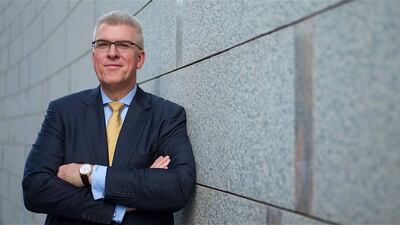Consumers face more investment choices today than ever before, but this comes with associated risks that they need to understand and work around, said Bryan Stirewalt, chief executive of the Dubai Financial Services Authority, the regulator of Dubai’s onshore financial hub.
"UAE regulators have launched a number of initiatives on financial literacy, cyber awareness and fraud awareness," Mr Stirewalt told The National.
“The DFSA routinely issues scam alerts and advisory notes to investors to be careful about advance-fee schemes, where people ask you to pay money upfront in return for a larger amount of money.”

The substantial increase in people working from home during the coronavirus pandemic presents more opportunities for cyber criminals and unscrupulous companies to exploit investors and compromise their portfolios.
Consumers and businesses in the UAE suffered more than 600,000 phishing attacks at the height of the Covid-19 stay-at-home measures, according to a report by Kaspersky released in August.
More than 2.57 million phishing attacks were detected across the Middle East from April through to the end of June, the global cyber security company said.
Speaking on the sidelines of the fourth annual Global Investor Week, organised by the International Organisation of Securities Commissions, Mr Stirewalt said there has been a huge increase in phishing attacks on the financial services industry during the pandemic.
“Given their current anxieties, people are more likely to click on suspicious links that they might not have otherwise," he said.
Mr Stirewalt said most people in the UAE are expatriates and may not know which brands are legitimate, making them more vulnerable.
He advised investors to avoid companies promising guaranteed returns and “get-rich-quick” schemes.
“If you want to make legitimate investment choices, consider options that will build your wealth over time,” he said.
With many investors unable to visit the brick-and-mortar offices of investment companies because of the pandemic, Mr Stirewalt said they can conduct research on the internet to check if companies are legitimate or not.
“All regulators will have a public register that will allow the public to log in and see if a company is licensed. Another easy alternative is to do a Google search on a company and see if a regulator is mentioned. If not, there might be an issue and you might not get the protections that you need,” he said.
With many financial service companies now signing up clients digitally, Mr Stirewalt said the sharing of personal data could add an element of risk and urged investors to check the credentials of the person asking for their data.
“Pay attention to email addresses and watch out for misspellings. If someone is writing to you as a representative of a financial company, make sure it is not from a Gmail or Yahoo personal account,” he said.
Mr Stirewalt said a good risk appetite is needed before investing in cryptocurrencies and other digital assets as they are “speculative instruments”.
“The best thing to happen was the price of Bitcoin dropping from $19,000 to $3,000. That taught people that you can lose money with this asset,” he said.
Younger generations such as millennials are more comfortable investing digitally, having a virtual bank account and dealing with financial services companies in an online format, Mr Stirewalt said.
“The UAE population is very digitally aware. Technology will drive the future of financial services and the UAE will be at the forefront of that,” he said.
Global Investor Week intends to raise awareness on investor education and protection, as well as highlight the initiatives of securities regulators in these two areas.


